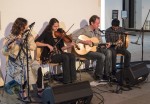About 300 people celebrated Irish author James Joyce at the Hammer Museum on Thursday.
The international celebration Bloomsday honors James Joyce and his 1922 novel “Ulysses” every year on June 16. Bloomsday is named after the novel’s main character, Leopold Bloom. Joyce fans celebrate the holiday with readings of the book, pub crawls and festivities from Dublin to Prague to Los Angeles.
The Hammer Museum’s seventh annual Bloomsday combined dramatic readings of the chapters “Telemachus,” “Proteus,” “Lotus Eaters” and “Eumaeus” with traditional Irish music.
Claudia Bestor, the Hammer Museum director of public programs, said the goal for Bloomsday is to unravel some of the ambiguity of Joyce’s text by reading selected chapters aloud at each year’s program.
“You get a morsel,” Bestor said. “You can digest it and absorb it more by breaking it into smaller pieces.”
Bloomsday brought “Ulysses” to life through music, Bestor said. She said Joyce mentions of hundreds of Irish folk songs throughout the novel, and the music in Bloomsday helps translate the songs referenced in the text to live music the audience can hear.
“Sometimes it’s somebody humming on the streets … sometimes it’s music that’s being played at a pub,” Bestor said. “We perform the songs as someone might have experienced them in Dublin at the time.”
Five of the six songs in this year’s Bloomsday program were Irish folk tunes, such as “There is a Flower that Bloometh” and “The Low-Back’d Car.” The sixth was UCLA doctoral student Stanley Gutman’s original composition — a piece for cello, baritone and piano that debuted at Thursday’s production.
Gutman won the opportunity to compose a piece for Bloomsday in December after the Hammer Museum posted an open call for music scores. The requirement, Gutman said, was to submit a proposal for a composition to complete a melody Joyce had written to the text of a W.B. Yeats poem, “Who Goes with Fergus?”
The composition selection committee consisted of UCLA professor of composition David Lefkowitz, director of the Herb Alpert School of Music Neal Stulberg and Bloomsday organizer Stanley Breitbart. Every composition student at the Herb Alpert School of Music was invited to submit a proposal for consideration, Gutman said.
Although Gutman said he had not read “Ulysses” himself, he was intrigued by the challenge of interpreting both Joyce’s original melody and Yeats’ poem.
“When I read the text, I knew I was going to use it at the climax of my piece,” Gutman said. “It’s a calling for you to come forth from your state of fear and unsettledness and surrender to the powers that be.”
Vocal performance alumnus Lyle Mitchell, fourth-year cello performance student Niall Ferguson and Bloomsday music director and pianist Mona Lands performed Gutman’s 10-minute composition.
Lands said Gutman’s composition brought a contemporary chamber music sound to the show. She said the highly technical piece was a challenge to rehearse but eventually became her favorite part of the production.
The musical performance “Who Goes with Fergus?” followed a reading of “Telemachus,” a chapter of the book that quotes the song’s lyrics. Gutman said although the literal meaning of the text is convoluted, the emotion in his music is clear.
“The music that underlies the vocal lines … really brings out the emotional underpinning of the text,” Gutman said. “It’s really showing what’s at the heart of the words.”
As for the dramatic readings of the novel, Bestor said many of the professional actors selected to perform the readings originally came from Ireland.
Irish actor Johnny O’Callaghan said he has performed at Bloomsday since 2010. He has played the role of Stephen Dedalus both at the Hammer Museum and in New York in Broadway productions of the show. He is intrigued with the double meanings and hidden symbols in Joyce’s writing, which keep him engaged with the text each year, he said.
Bestor said the Hammer Museum did not initially anticipate Bloomsday to become an annual event. However, she said the celebration stuck because it makes the famous text accessible to audiences through spoken word and song.
“(Bloomsday) is not meant to be for scholars or English majors only,” Bestor said. “It really is a multi-sensory celebration of great literature that you don’t need to have read ‘Ulysses’ for to appreciate.”
